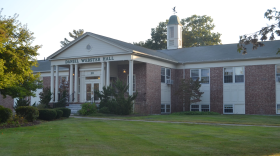Earlier this week, some Nashua residents shared their frustrations and confusion about state regulators processing an air permit for a proposed asphalt plant that was already rejected by the city’s planning board.
At a public information session at Nashua High School South, state officials said their process to determine whether the asphalt plant should get an air permit is separate from the planning board’s process and will have no bearing on the city’s decision.
“I can appreciate how it’s awkward,” said Todd Moore, air permit programs manager with the Department of Environmental Services. “We do not have a choice. It is our job to respond to applications.”
Nashua’s planning board rejected the asphalt plant proposal in June 2023. Currently, Newport Bituminous, LLC, is suing the city, alleging the plant was wrongfully rejected and is seeking to overturn the planning board’s decision.
“Isn’t this just a waste of your precious resources and our time and money? If you grant a permit, will this then help the company as they sue the city of Nashua? And so then, is the state working against the city?,” said Sara-Jane Knoy, executive director of the Granite State Organizing Project.
A community meeting of this kind was a new experience for the Department of Environmental Services, which generally holds formal public hearings after doing a technical review and issuing a draft permit.
Padmaja Baru, the new construction and planning manager with the Department of Environmental Services, said part of the motivation for the community meeting was the amount of local interest and concern they’d heard about the proposed plant about air emissions and traffic and odors from this asphalt plant.
She said the agency is following federal environmental justice guidelines for enhancing community engagement, including meeting with community leaders ahead of time, publishing notices in local newspapers, providing interpretation and translation services to Spanish and Portuguese, and making it easy for people to sign up as “interested parties,” so they can get notified about the permitting process. But on Monday, Baru said no one requested one of the 30 headsets the department had for language interpretation.
Some Latino community leaders who have been campaigning against the asphalt plant said they were not aware the meeting took place,as no one notified them. “We would have been there,” said Angela Mercado, who leads a small Latino community center a few blocks from the proposed site. She thinks the problem might have been lack of in-person outreach to the Latino community.
“Nobody told us,” said Martha Alvarado, a leader in the state’s Colombian community.
The sticking point for those who did attend the meeting, though, is that state regulators actually cannot consider many of the issues the public is concerned about, like traffic and odors.
Concerns environmental regulators can take into account
Regulators said they would investigate odor complaints to see if there’s an operational issue at a plant, but they do not regulate odors. They also said noise increases, truck exhaust, and traffic are not within their ability to regulate.
“We know those are legitimate concerns,” Moore said, “They’re definitely not regulated through our permitting system. And we’re not aware of regulations outside of our permitting system that would address those concerns.”
![“Search your moral heart [...] please provide clear, scientific and reasoned dissent if you believe this application is bad for the community," Deacon Kristy Bessada from United Methodist Church told regulators at a public information session on Monday, Feb. 12.](https://npr.brightspotcdn.com/dims4/default/ac59499/2147483647/strip/true/crop/2048x1365+0+0/resize/880x587!/quality/90/?url=http%3A%2F%2Fnpr-brightspot.s3.amazonaws.com%2Fa8%2F36%2F29009dd043aba3d1206f90cf80a6%2Fdeacon.jpg)
Ann Podlipny, a resident from Chester, was concerned about the people from Nashua being taken advantage of by big companies that refuse to acknowledge the lives of the people where they build their facilities.
“It is really a question of profit over people,” she said.
Some state legislators are trying to create new opportunities for these kinds of concerns. HB 1170 would require the Department of Environmental Services to “ensure that human values, safety, and concerns receive proper consideration during planning and project development.”
Air monitoring
For now, the Department of Environmental Services will conduct a review of the company’s application to determine if their plan for operations can control emissions enough to meet the state’s standards. The rules don’t require direct air monitoring of air pollutants by the state, but the applicant would be expected to monitor its equipment to make sure it’s operating properly.
If the asphalt plant were permitted, Newport Bituminous, LLC, not the state, would do a test to see if they were complying with emissions limits, and the state would conduct periodic inspections every five years.
Regulators will use EPA guidance to estimate emissions that would come from the plant based on testing from similar devices and other hot-mixed asphalt plants, like the one in Flint, Mich. That project has been criticized for using state air monitors that are far away, and advocates there have argued the data gathered by the company is inaccurate, raising doubts about the emissions data they presented to pass federal pollution standards.
In New Hampshire, regulators said there are air monitoring stations set up throughout the state, including one in Nashua, that monitor things like ozone levels, but they do not measure the particulate matter this kind of industry emits.
Some residents questioned the state’s regulations that allow the companies to self-monitor, rather than having external monitoring from the state. .
“That's very concerning for all of us who live within that area,” said Nashua Alderman Patricia Kelly.
Regulators explained during the meeting that the proposed plant would consist of equipment to combine hot liquid asphalt with recycled asphalt pavement, gravel, sand and stone. It would include equipment to collect dust, and a device called a “baghouse” that controls how much particulate matter – or soot – is emitted from the facility.
Pollutants can come out of the part of the plant that mixes together the hot liquid asphalt with other materials. Those include regulated pollutants – particulate matter, sulfur dioxide, carbon monoxide, and nitrogen oxides – as well as other substances including volatile organic compounds, some of which may have adverse health effects; hazardous air pollutants, which are known or suspected to cause cancer or other serious health effects, and regulated toxic air pollutants.
The plant could also emit “fugitive emissions,” like dust, which do not pass through a stack or a vent that could mitigate them. Regulators said asphalt plants are required to control fugitive dust.
Read more about the neighborhood where the plant's been proposed here.
New Hampshire has “ambient air limits” for regulated toxic air pollutants, which are based on the health effects of those pollutants on humans, and must be met at the boundary of the facility’s property “and beyond.”
Those limits are the same everywhere in New Hampshire – the same limit is in place for the middle of Nashua, and a rural area, regulators said. The standards are based on how much of a pollutant a person could inhale throughout a specific period of time and not experience adverse health effects.
United Methodist Church Deacon Kristy Besada asked officials to make a decision thinking first about the wellbeing of the community and not just the law.
“Would you please as citizens also consider the long American tradition of dissent,” she said. “Search your moral heart [...] please provide clear, scientific and reasoned dissent if you believe this application is bad for the community.”
If the state decides the facility will be able to meet emissions requirements, they will issue a draft permit. After that, a public hearing will be held in Nashua.









